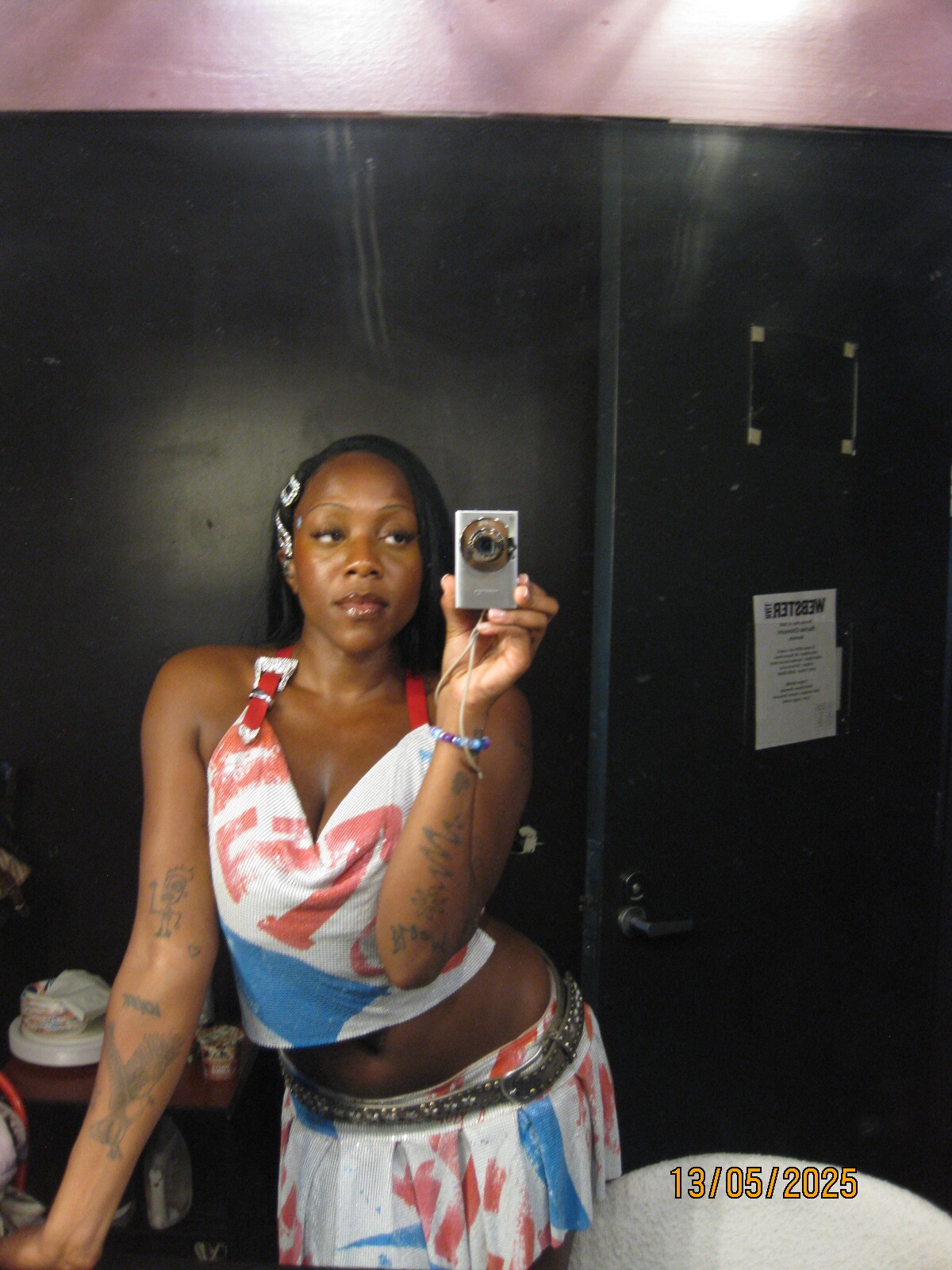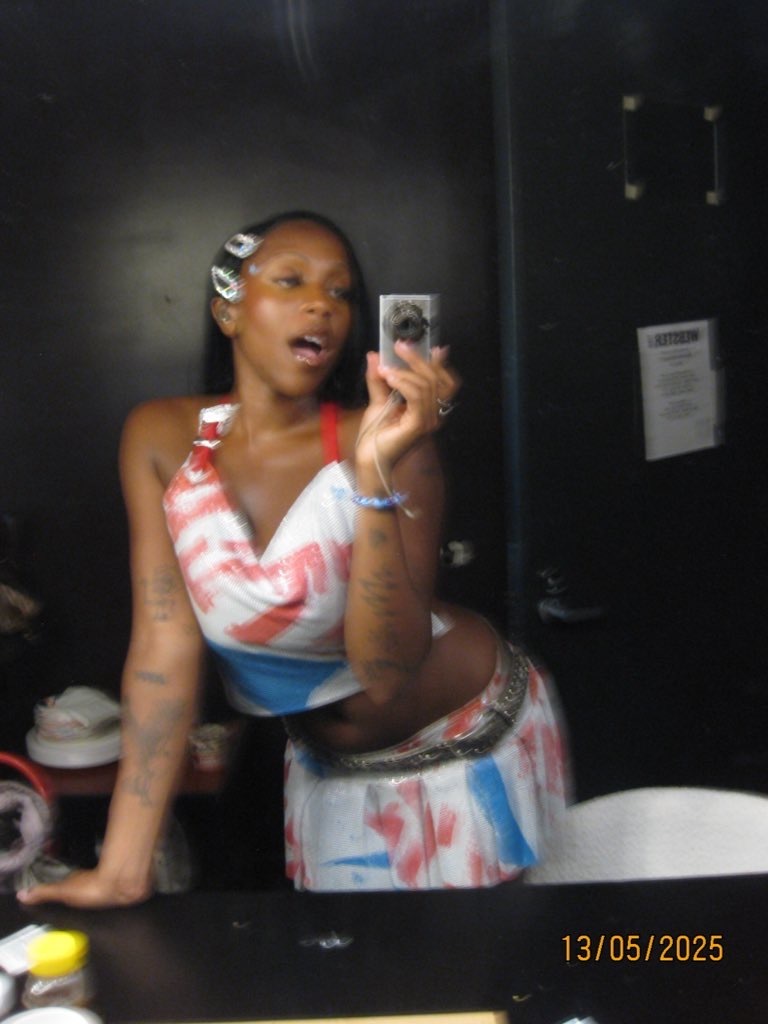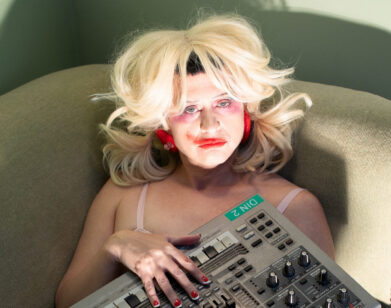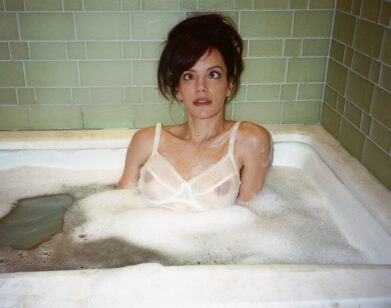BADDIE
Rachel Chinouriri Wants You to Stop Drinking the Dumb Bitch Juice
On a video call all the way from London, the British pop star Rachel Chinouriri reflected on her upbringing as a young Black girl at an all-white school. “Maybe I’m a bad bitch and they were a little bit scared,” she said. Now, Chinouriri is strutting her stuff on stages all over the world—in her knee-high socks, sequin tank tops, and the miniest of mini skirts. But it wasn’t always easy. England-born and Zimbabwean-raised, Chinouriri always felt like she was walking the tightrope of the British indie music scene as her mother, raising the young artist in the traditions of African culture, called her home. At 17, she took a chance at pursuing her dreams by uploading her music to Soundcloud, a move that quickly began to pay dividends. In May of 2024, Chinouriri released her debut album, What a Devastating Turn of Events, eventually catching the attention of Sabrina Carpenter, who enlisted Chinouriri as the opener on the European leg of her Short n’ Sweet Tour. Now the “Never Needed Me” singer has temporarily traded a Union Jack for stars and stripes as she makes her way to stages stateside. “Going to America feels like I found my nuts friends,” she said. But before crossing the pond, the budding pop princess hopped on a call with us to chat about cutting off toxic exes, finding her personal style, and the importance of wearing shower shoes in dingy truck stops on the road.
———
ARY RUSSELL: What time is it where you are?
RACHEL CHINOURIRI: It is 3:36 in the afternoon.
RUSSELL: And you’re in London?
CHINOURIRI: I’m in London, yep. I’m at home.
RUSSELL: So you’re about to go on tour. You’ve been to the US, right?
CHINOURIRI: I’ve been to the US a few times, but this is going to be like, a long time. ‘ve only been to Austin, Florida, L.A., and New York, so I’m going to be seeing a few places.
RUSSELL: How did those compare?
CHINOURIRI: I think that New York was my favorite, but I think it’s because I live in London. The UK is more spread out and New York is more like, everything’s on top of each other, which I prefer. Also, I was hung over almost every single day when I was in New York. So yeah, pretty fun. No one sleeps there, which is great. And then L.A. was just very hot, but it felt very empty. It felt a bit derelict, unless you go into a building, which I find strange. And then you just see loads of random celebrities, which is also interesting. And then Texas was really fun. Oh my god, the food in Texas was quite insane. And then Florida, I went there as a kid because my mom was looking for a beach for Christmas and Daytona Beach was the cheapest one. It was definitely an interesting experience, and it felt slightly dangerous.
RUSSELL: I’m not going to lie to you, you get some weirdos over there.
CHINOURIRI: With my mom, an African lady, not really knowing. And hen we get there and she’s like, “Oh…” And I’m like, “Did you not research what we were doing before we got here? This is not it.”
RUSSELL: It’s literally not. I was reading that you grew up in this kind of traditional African household, but you got into British culture a little bit later in your life. And I read that Lily Allen was a big influence. What else?
CHINOURIRI: Skins, Inbetweeners, stuff like that. I was the only one born here of my whole family. But then I met other Black kids who were feeling really English, but were obviously not. The older I get, I’ve learned a degree of appreciation for how the Brits are, but I also see how we can be perceived another way. British people speak very flat and with no expression, but if you just think that every time you speak to a British person it’s 50% sarcasm, no matter what they’re saying, they then become a lot friendlier. I’m kind of obsessed with it, but maybe it’s just because I grew up here.
RUSSELL: You’re balancing these two different identities, being ethnically Zimbabwean but culturally British. Did you find that there was pushback or internal conflict?
CHINOURIRI: I guess when I was younger, I almost didn’t want to be Zimbabwean. I was embarrassed by it. But I also grew up in an all-white neighborhood, I went to an all-white school until I moved to a school which was almost all Black and POC. And then, there were maybe less than 10 white people in my year, which was quite a big flip. When you’re 13, you start fancying boys and wondering how attractive you are and stuff. And then when you’re seen as the ugly one, you start being like, “Well, it’s because I’m Black.” And then you go to a new school and people actually fancy you and you’re like, “Oh, it’s because they’re racist.” So I think that’s just the journey of learning to love myself.
RUSSELL: I feel like you touched on a quintessential experience for a Black girl or a girl of color in a predominantly white or European space—this feeling of undesirability. Is that reflected in your music?
CHINOURIRI: Yeah, I think so. When I was younger, I didn’t understand that, yes, in one way there was a layer of people being racist, they were miserable and going through really horrible times with their families and stuff. But the easiest thing was to go for the next easiest target, which for them will be someone who is Black. They become a very easy target in those sorts of spaces. And then I realized that maybe I’m a bad bitch and they were a little bit scared.
RUSSELL: It definitely builds a thick skin. You will not meet anyone stronger than a Black girl who grew up in the suburbs or a predominantly white space. I think it preps you for the kind of rejection that you might get in the music industry, especially because the indie rock space that you wanted to enter was and still is predominantly white. Did you get any pressure early on in your career to tick with R&B or a hip hop sound?
CHINOURIRI: 100%, yeah. I think it’s so crazy saying it now but yeah, 150%, actually. For example, I didn’t really grow up listening to Erykah Badu and stuff, but I discovered them later in my teens. But then people would be like, “Oh, well of course you must listen to Erykah Badu and Lauryn Hill, and that’s what your music is going to sound like.” And I’d be like, “Oh, I’m going to check them out.” People were like, “Well, that must be your influence.” I’m glad I discovered it because it’s quite legendary music, but to then try and explain to these people the music I’m making, it’s almost like it doesn’t make sense to them.
RUSSELL: Exactly. I wanted to bring up “Dumb Bitch Juice,” because that’s one of my favorites. It resonates with anyone who’s been in a toxic situationship that they know they should get out of, but they’re drinking that dumb bitch juice and they’re just like, “No, he’s different.” Do you have any advice for anyone who’s listening to that song and just keeps going through the motions?
CHINOURIRI: If you follow your gut instincts, because your gut instinct is your future. Just because you’re having tequila shots doesn’t mean anything. Stop yourself from speaking to these people. I mean, my strategy is to pretend that they no longer exist. I block and delete [them] on everything, meaning that I am physically incapable of messaging them and they are completely incapable of messaging me. That is the only way that I think I can get over these situations, and I think more people should do it.
RUSSELL: I’m going to be taking that advice for sure. Let’s dive into the tour a little bit. What are the must-have essentials that you bring on the road?
CHINOURIRI: Wipes for the toilet, because I hate public toilets. Toilet wipes, surface wipes, everything. Steamer, flip-flops because showers, I can’t have my feet on the floor. Basically, I’m a bit of a germaphobe until them budgets start going up. And my headscarf, my flip-flops, a nice face wash, an expensive body wash, so that even when you’re in the most grim place possible, there are things that make it feel better.
RUSSELL: You want a little bit of luxury.
CHINOURIRI: In the cold back of a truck station next to a urinal, those are the things you need.
RUSSELL: What would you say are the biggest differences between American crowds and British crowds?
CHINOURIRI: Well, I thought the UK crowds were rowdy, but I do remember when I did my New York show at Baby’s All Right, they were loud as hell. I was actually in complete shock. British crowds can be loud, but there was just a level of unhinged that I’ve not witnessed before, which I absolutely loved. I’m the kind of friend who’s more quiet and introverted, and then my friends are absolutely nuts. And going to America feels like I found my nuts friends. But in the UK, I have my calm friends. People shouted out the most rogue things.
RUSSELL: Queuing culture in America is so crazy. People will overnight it. And by the time they get into the venue, they need to let out all of their excitement. Sometimes I’m like, “Chill out.”
CHINOURIRI: Yeah. Calm down, calm down.
RUSSELL: You just got off tour opening for Sabrina Carpenter. You looked so good and the shows looked incredible. Was there anything that you learned from Sabrina, or any tips that she gave you?
CHINOURIRI: Her professionalism, number one, while also still being fun and young. Then I’m like, “Oh my god, you’re like a whole year younger than me. What the fuck?” And she has six albums. And tour is very exhausting, which I don’t want to complain about because it’s a privilege to be able to do. However, I think sometimes your levels of tiredness and stuff can overwhelm you. But she seems to be someone who is not overwhelmed at all, and if she is, you wouldn’t be able to tell. She’s sure of herself, but not in a cocky way. And she is so endearing and so lovely. Even her team is exactly the same, and I love that. The world belongs to her. I’m living in Sabrina’s world.
RUSSELL: Everyone’s living in Sabrina Carpenter’s world. I was doing some Instagram stalking and I saw a post of yours from 23 weeks ago at your Brighton date, where you went into the crowd to take pictures with fans. Is there a bittersweet feeling knowing that, pretty soon, the crowds are going to be too big for you to do that?
CHINOURIRI: Oh yeah, I did do that. [Laughs] There’s an element of me that wants to try and keep that, but I know that it’s really hard. I’m like, best friends with some fans, because they’ve been with me. But whether you’ve known me for a day or for years, you all deserve my attention and love, so it’s about trying to figure out how to spread that in the right ways. And that’s what I’m currently learning. They message me, like, “Girl, someone pushed me at your show and in the queue, they were doing this and that.” And I listen to it all.
RUSSELL: You’re a mother.
CHINOURIRI: You know, I’ve got some kids.
RUSSELL: Also, I’m so obsessed with all of your outfits. They’re dreamy and sparkly, but there’s also a certain level of distress, if that makes sense. So I wanted to pick your brain a little bit about how you’re picking your outfits and the collaborative process with you and your stylist.
CHINOURIRI: You know what’s crazy? If I could choose, I’d be in a black hoodie and some trainers every single day. I’m a big comfort girly, but I do love a mini skirt and a small top. Working with my stylist has really helped me basically heighten those. And she just does all these accessories. She chooses them and customizes them and stuff like that. But it still feels very, very me. I think this is the first time I’ve really experimented with style and fashion in that way. Being on the Sabrina tour, I was kind of like, “I want to enter that world.” So it was really fun to come up with the outfits for that world that she had made.
RUSSELL: It’s like playing dress-up. You get to play “pop star.”
CHINOURIRI: Exactly.








